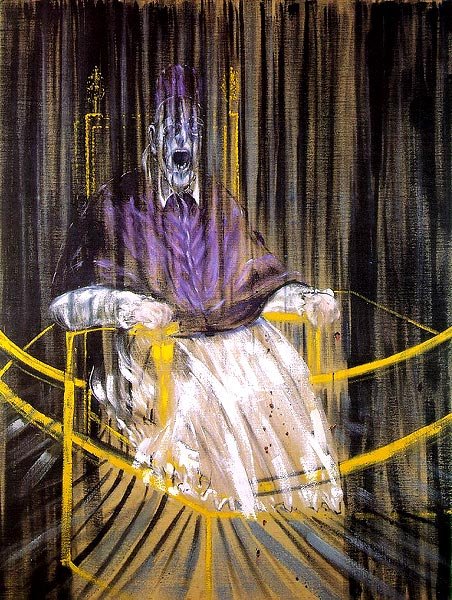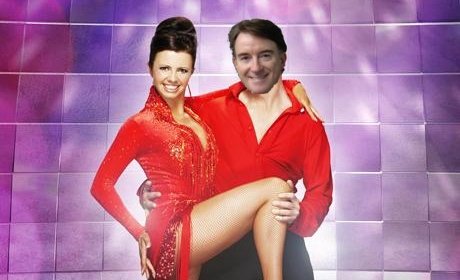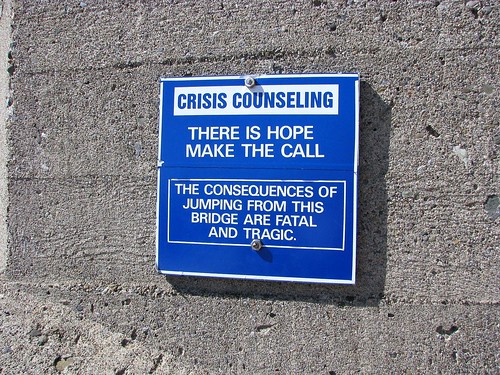-
more talking starling.
-
cool video via Metafilter. ‘Here is a remake of the “Thriller” song that I’ve entirely recorded with my own voice, using 64 A’cappella tracks. There is therefore no instrument, synthetizer, beatbox, or even to sampler, but only the sound of my voice livened up with Reverb and slight Chorus on certain tracks.’
-
cool video
-
‘We can confidently plan to get evening good-light photographs of a town after we visit the local McCain office, because we know it will be closing by 5 pm, as the office in Wilmington, North Carolina was this past Sunday. The plan is, get to inevitably closed/closing McCain office, get an hour of photos near sunset, then visit the bustling local Obama office.’
Tag: news
In a wailful choir the small gnats mourn
Is it just me, or do these market crashes always seem to happen in the autumn?

Maybe the current crisis isn’t the result of years of cheap credit and over-leveraged banks. Maybe it’s actually an atavistic response to the nights getting longer. Too many bankers go for a few days in a row without seeing daylight, and their deeply-buried lizard brain starts whispering to them that the world is ending.
» The photo, days get darker… by Mathias Erhart is from Flickr and used under a CC by-sa licence.
Mood music for the apocalypse
It seems weirdly fitting that the Tate’s two current big exhibitions are Rothko and Bacon. I don’t suppose that the Tate can take any responsibility for the gloomy state of the world’s financial market: I don’t think it’s all because City bankers are popping over in their lunch break and being given the willies.

I wonder, though, if you swamped the world’s financial centres with upbeat, cheerful stimuli, whether it would soothe the savage breasts of the money-men. Plaster New York with huge posters by Thomas Kinkade and Beatrix Potter; have Sesame Street and the Tellytubbies playing on big video screens. And all those glowing, scary tickers: don’t have stock values on them, go for zen koans and dirty limericks.
Podcasts I listen to, part 1
Hardly a day goes past without nobody asking me what podcasts I listen to. So, in defiance of public demand, here goes. This is the first of two posts, in alphabetical order.
Adam Buxton and Joe Cornish have a radio show on BBC Radio 6; Radio 6 is a music channel, but because of licensing restrictions, this is their show with all the music taken out so that you’re just left with their chatter. Which is, clearly, a great idea, and I only hope that the BBC never manages to negotiate a version of the podcast with music on it.
Silly and reliably entertaining.
Even sillier, and also entertaining. People submit questions, Helen and Olly answer them.
Videos of Steve Jobs doing his bit as the Freddie Mercury of the computer industry. Boom! Probably only one for Apple fanboys like myself.
Armstrong & Miller – Timeghost
Comedians Alex Armstrong and Ben Miller provide culturally-themed chitchat in the personae of art critics Craig Children and Martin Baine-Jones. I’m not really convinced that they’ve worked out how to get enough value from doing it in character, but after a weak start it’s now an entertaining show.
A selection of highlights from BBC Radio 3’s arts coverage. Variable but worth a listen.
This is probably the single podcast I would recommend most strongly: John Oliver (that English bloke from The Daily Show) and Andy Zaltzman (English comedian) provide satirical comment on the week’s news. Very very funny.
An occasional podcast from the nice atom-smashers in Switzerland. It has mostly been (interesting) cheerleading so far; now that the LHC has been turned on and then gone phut, it’ll be interesting to see if they do a podcast about the problems
The Collings and Herrin podcasts
Comedians Andrew Collins and Richard Herring. Funnny enough that I keep listening to it, but every time I find myself thinking that it could usefully be just a bit shorter.
Depending on the time of year, either The News Quiz or the Now Show, two current-affairs comedy shows on BBC Radio 4. The News Quiz has unsurprisingly lost some of its lustre over the past couple of years since the sad loss of Linda Smith and then Alan Coren — difficult people to replace — but it’s still worth listening to.
Front Row is a daily arts programme on Radio 4; this is a weekly highlights package.
Global Arts and Entertainment (World Service)
Selected arts coverage from the BBC World Service. Variable but worth subscribing.
The return of Mandelson
It was a weird moment to see Peter Mandelson of all people return to the cabinet. Particularly weird, for me, because I had been half-heartedly composing a mental list of the celebrities I would most enjoy seeing on Strictly Come Dancing*, and so far the only people definitely on it were Christiano Ronaldo, Rachel Weisz and Peter Mandelson. He is, one way or another, one of the most intriguing political figures of the last fifteen years.

All the analysis in the papers has been focussed on the electoral logic of it — the need to build bridges within the Labour party seems to be the popular explanation — but I’m not sure I buy that; he’s certainly not someone the voting public have ever warmed to. Perhaps Gordon Brown really does just think that Mandelson is the right person for the job.
Which scares me a bit. Not because I have any doubts about Mandelson’s competence and expertise; on the contrary, because he is associated in the public mind primarily with spin and internal party feuding, I suspect he’s never been given enough credit as a talented politician. No, it’s because if the seriousness of the economic situation was measured in terms of things Gordon Brown is worried enough to do, then ‘cut a fraction of a percent off interest rates’ might be economic DEFCON 4, with ‘nationalise a high-street bank’ as DEFCON 3, and if everything we’ve ever been told about their relationship is true, ‘give Peter a job in my cabinet’ must be about DEFCON ‑27⁑.
* note for Americans: what you call Dancing With the Stars.
⁑ Amusing trivia I learned from the Wikipedia DEFCON article: the British equivalent is called the BIKINI state.
I haven’t commented much, because I don’t think my political instincts are that brilliant even for the UK, let alone a country I haven’t visited for over a decade. But I’ve been enjoying the US elections ever since the primaries: the Americans always do democracy on a bigger scale than the rest of us, but this time round it has been more dramatic than ever. Not so much political theatre as political epic. The Cinton vs. Obama storyline alone was more exciting than anything that’s likely to happen in our own next general election; and it kept on getting more remarkable. I mean really: Sarah Palin! You couldn’t make it up. It adds to the fun, of course, that it definitely means the end of Bush and probably a Democrat in the White House.
But since the world’s financial sector apparently started circling the plughole, I’ve been unable to take the same kind of simple pleasure in the whole thing.

This is genuinely scary. When apparently well-informed people start making comparisons with the Great Depression: eep. Even if they’re saying things like ‘with the right government intervention we should be able to prevent this turning into anything like the Great Depression’: still eep. What Sir Alex Ferguson once called ‘squeaky bum time’.
Neither candidate has exactly covered themselves in glory over this issue. McCain’s stunt of ‘suspending’ his campaign and rushing back to Washington was the undoubted low point, but neither of them has said anything that convinces me that they have exceptionally clear insights or solutions to offer. Neither of them has made a strong and unambiguous case either for or against government intervention. I understand that since they are not in office and are in the middle of an election campaign, they are in the worst possible position to be unbiassed and pragmatic; perhaps it’s too much to expect to ask them to rise above the politics of the moment. But they haven’t. Neither of them has managed to step in and fill the leadership void left by the complete disintegration of Bush’s credibility.
When asked in the debate how the crisis would affect their spending plans, both of them fluffed the issue: Obama just restated all the things he wants to spend money on, and McCain came out with some ludicrous crap about cutting earmarks. I’m not expecting them to come up with new plans on the fly, several months in advance and without knowing how the situation will change, but it would have been nice to see them engaging seriously with the question.
And that leads me onto the last point: this is a horrible time to become President. I will be thrilled to see Obama elected, insha’Allah, but I think the job may be a poison chalice. Just to take healthcare: there’s no doubt at all that America can afford a proper healthcare system, since Americans already pay more than everyone else for healthcare as it is. But it is money that will have to come from somewhere, and the state of the economy will not make the politics of it any easier.
Frankly, even if it wasn’t for the economy, the next President would have enough on their plate dealing with Iraq. It may be that there there is no good exit strategy from Iraq, but we who invaded the country have some responsibility for what happens to it. As the shop sign says: you break it, you’ve bought it. I would vote for Obama, if I had a vote, at least partially from a belief that he wouldn’t have invaded Iraq in the first place, and therefore that he is hopefully less likely to get into some new foreign adventure of his own. But I don’t have any faith that he knows how to sort out the mess in Iraq now. Would McCain do any better? I don’t know. I suspect that to do the job properly would take decades, and I don’t think there’s the political will in America to commit to that kind of timescale anyway. The Iraqis might not be thrilled either.
All of which adds up to: It’s a lot harder than it was a few months ago to look forward to the election with a sense of optimism.
» the picture, Last Chance, is © huangjiahui and used under a by-sa licence.